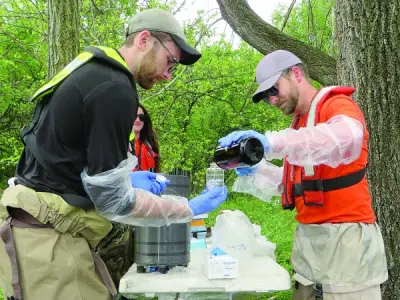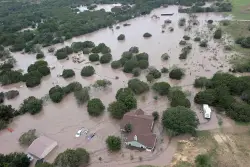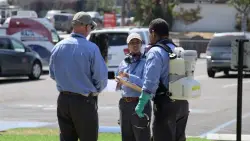Above the Waterline: Science center saved by Georgia senators

Courtesy USGS Science—with its intimidating math, abstract concepts, and analytical thinking—was never my strong suit in school. I’ve always been more comfortable with language and verbal communication. When I helped found the nonprofit Chattahoochee Riverkeeper (CRK) thirty years ago, I knew that it would be essential to identify local scientists: experts who could provide our team with river data and analysis to serve as a foundation for our education and advocacy work. My master’s degree in environmental planning from Georgia Tech had offered a broad range of knowledge and emphasized big picture thinking, collaborative approaches, and problem-solving techniques: useful skills, but not enough to accomplish our organization’s mission. At several federal agencies located in the Atlanta area, I found hydrologists, biologists, engineers, geologists, ecologists, and other specialists who were willing (even happy) to provide the information we needed. Some of the very best water scientists were at the U.S. Geological Survey (USGS), an agency within the U.S. Department of Interior. Over the years, these individuals have never failed to help us, and many others in Georgia, to ensure that our work was based on science and fact. Gold Standard Established nearly 150 years ago, USGS monitors natural resources and landscapes in the U.S. and provides scientific information based on rigorous data quality standards. It is the nation’s largest water, earth, and biological science and mapping agency—the gold standard for information that helps keep us, our communities, and our businesses alive and thriving. The agency is also vigilantly non-partisan. Without a fully functioning USGS, the National Weather Service cannot issue accurate flood warnings. Transportation agencies won’t know how strong or high to build bridges. Water management agencies—like the Georgia Environmental Protection Division—won’t be able to balance water requirements for homes, businesses, farms, and ecosystems. On Atlanta’s Chattahoochee River and elsewhere, boaters, fishermen, and swimmers won’t know if the water is safe. Two years ago, a water quality monitoring program managed by USGS, Chattahoochee Riverkeeper, and the National Park Service identified—and ultimately stopped—a massive sewage spill into the river that summer. When an exceptional drought scorched north Georgia in the late 2000s and lake levels plummeted, USGS provided real-time monitoring data that helped local and state officials make critical public health and safety decisions. When epic floods deluged Atlanta in September 2009 and caused more than $500 million in damage to homes and businesses, USGS personnel worked round-the-clock to provide the National Weather Service and the public with vital information. Termination Proposed Not long after businessman Elon Musk began to wave his destructive wand over federal agencies as instructed by Donald Trump, his Department of Government Efficiency (DOGE) proposed to terminate leases for more than thirty water science centers around the country. In March, Chattahoochee Riverkeeper discovered that the South Atlantic Water Science Center (Science Center) located in Norcross was on the hit list; the facility coordinates the monitoring of waterways throughout Georgia, South Carolina, and North Carolina. With its lease set to expire in the near future, our Science Center was apparently low-hanging fruit for those intent on strangling the federal government in the name of efficiency. No analysis of closure impacts on the local economies, communities, or the environment had been conducted to justify the termination. The closure of the Science Center would save a paltry sum (a little over a million dollars a year), while jeopardizing the collection and evaluation of monitoring data needed by weather forecasters, emergency responders, insurance carriers, and the public. According to one knowledgeable observer, disaster managers would be “flying blind,” as data vanished. Power of Persistence After CRK and others briefed Georgia’s U.S. Senators Jon Ossoff and Raphael Warnock, they issued a joint letter in April to Interior Secretary Doug Burgum. The letter stated that the closure of the Science Center would hamper our state’s ability to safeguard people, property, and the environment. Public statements by the senators at hearings, media coverage, and strong public opposition led to an unexpected DOGE reversal. Secretary Burgum rescinded the termination of the USGS Center lease in mid-June. He acknowledged a mistake had been made and highlighted the Science Center’s importance for clean drinking water sources and water flows needed for agriculture, industries, military bases, and others uses. That crisis has been averted, at least for now. This happy result underscores lessons I’ve learned over the decades. Action matters. Wins should be celebrated before tackling the next challenge; there will always be one. Leaders, like Senators Ossoff and Warnock, who demand that decisions be made based on facts and science, must be thanked and supported. Still Under Attack Our nation’s scientific infrastructure faces a multi-front attack—at USGS and dozens of other federal agencies whose mission is to safeguard the public’s health, safety, and welfare. Threats are increasing with the Trump regime’s fiscal year 2026 budget request. The proposed budget includes a massive funding cut of $564 million for USGS: a recommendation in the Project 2025 policy playbook prepared by the conservative Heritage Foundation. Nearly 40 percent of the agency’s current budget will disappear if the proposal is approved. Under consideration—according to informed observers of the Trump anti-science machine—is a move to fundamentally shift the 150-year-old mission of the USGS. The agency would focus on the collection of data and not so much the analysis: a largely meaningless exercise. Proposed USGS budget cuts also call for the elimination of the agency’s biological research program (Ecosystem Mission Area). Real-time water and hazard data is critical to cope with the accelerating climate crisis. It is irresponsibly reckless to abolish a program that provides evidence-based solutions to help communities manage flooding, drought, wildfires, heat waves, and rising seas. The post Above the Waterline: Science center saved by Georgia senators appeared first on Rough Draft Atlanta.


